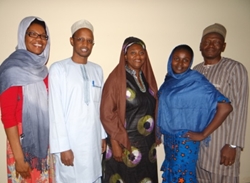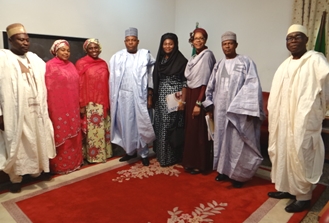BORNO STATE, Nigeria, 13 November — More women and girls are being kidnapped and raped in north Nigeria, following the recent insurgency, said the Governor of the State of Borno, Alhaji Kashim Shettima. Borno is one of three Nigerian states in the north-east of the country that remains under a state of emergency since May, as part of Nigerian President Goodluck Jonathan’s attempt to restore peace and bring normalcy to the states.
“We need friends that care for the people of Borno in this trying period,” the Governor said. He highlighted the impact of the insurgency on women and girls, and called on UNFPA to specifically support them. He reaffirmed the state’s commitment in partnering with UNFPA and restated the value of the partnership in advancing the cause of women and girls, especially in the areas of reproductive health and in responding to the humanitarian and development needs of the people of Borno.

The Nigerian Commissioner of Health, Hajiya Salma Anas Kolo, said that UNFPA staff members’ expertise was invaluable in helping to rebuild the social fibre of the state. Ms. Akyeampong expressed UNFPA’s commitment to the state and its reprioritization of sexual and reproductive health, gender equality and ending violence against women, HIV prevention, and strengthening health care delivery, including procurement of essential reproductive health commodities and supplies in the emerging humanitarian context of the state.
She acknowledged UNFPA’s long-standing collaboration with the Government and the people of Borno since the early 1970s, demonstrated more recently by the payment of the Government counterpart cash contribution (GCCC) of Naira 80 million. This was used by UNFPA to support the renovation of 10 health facilities; strengthen the capacity of over 40 Planning Officers to incorporate population and development, reproductive health and rights and gender equality issues into development frameworks and policies; and support traditional and religious leaders in addressing cultural barriers to the uptake of emergency obstetric care services in the health facilities.
Ms. Akyeampong highlighted the availability of Reproductive Health/Mamma kits and Dignity kits, which could be provided to the State of Borno once the logistics were agreed on with the Ministry of Health to deliver the kits at the level of health facilities.

She said that although a UNFPA staff member is no longer located in the state, the National Programme Officer of Adamawa doubles up as Programme Officer for Borno. UNFPA would continue to provide technical support to the state. A humanitarian/technical team accompanying her consisted of the Programme Coordinator/Head of the Office for Kaduna, which covers the northern states including Borno; the National Programme Officer with direct programme responsibility for Borno; and two humanitarian experts seconded from the Norwegian Refugee Council to UNFPA Nigeria.
This team met with state implementing partners from three key ministries – Health, Women’s Affairs and Planning, the State Emergency Management Agency and NGOs including the Red Cross – to assess the humanitarian and development needs and to develop a work plan.
The Governor expressed his appreciation for the support provided by UNFPA and said that normalcy was returning to the state. He committed to paying for the GCCC over the next programme cycle.


